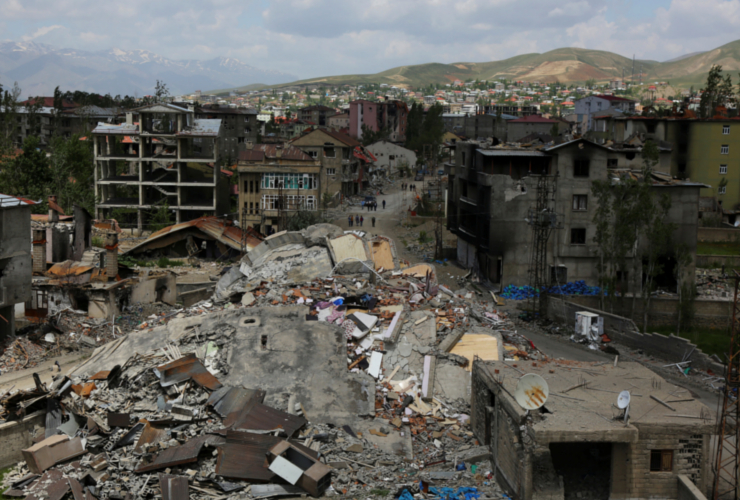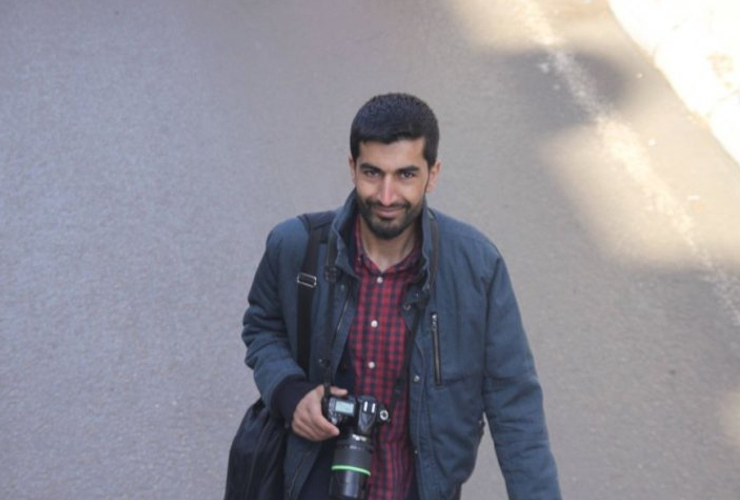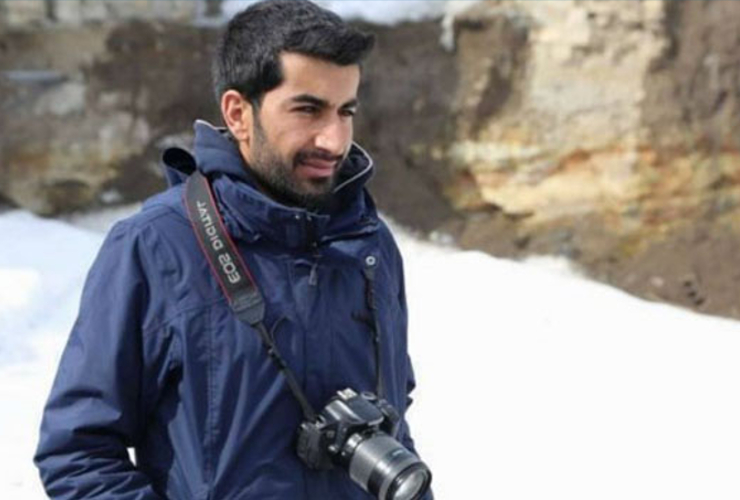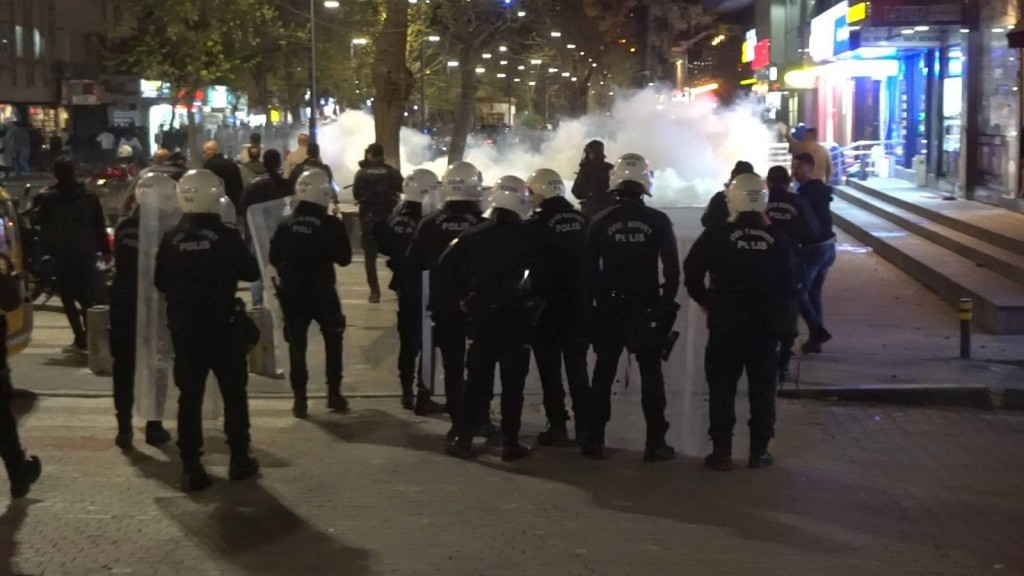Zur deutschen Version
Türkçesi için tıklayınız.
Turkish-Kurdish photojournalist Nedim Türfent has spent two years in solitary confinement. His crime? Journalism. Meltem Akyol, an editor with Turkey’s independent Evrensel newspaper, reports for the International Press Institute (IPI).
Journalist Nedim Türfent has spent the last two years deprived of his freedom in a single-occupancy cell in a “T-type” prison in Van, eastern Turkey. Türfent is serving out a custodial sentence of eight years and nine months. He remains in solitary confinement.
Following pressure by his lawyer, Türfent is now allowed access to an exercise area along with three other inmates. He is kept in solitary confinement because he is a journalist. According to the governor of the prison, “if he were moved to a normal cell he would write a news report every day”.
Türfent stresses the fact that when pressure mounted during the dark days following the breakdown of the peace process in Turkey, the first targets were the truth and the journalists who wrote about it.
From his prison cell, Türfent wrote to us:
“The border with Syria was deserted in journalistic terms – you know, the outlying cities, town and villages. So I was doing my best to give a voice to those people who would not normally be heard. And this is why I felt as though journalism was my true calling and I became a journalist.”
He sends his greetings to supporters, stressing that he will not rest from writing the truth and from carrying out his profession.
“We will come out of these dark days together”, he wrote.
‘Now you will see the power of the Turk’
It is spring 2016. There is a sniper curfew preventing people from going out on the streets in the Yüksekova district of Hakkâri, a province in southeastern Turkey. Images from a video taken at a construction site have caused shock waves in the Turkish media. The video showed a team of the Turkish security forces’ Special Operations (SO) unit taking 50 workers, both young and old and handcuffing them behind their backs before forcing them to lie on the ground.
The SO team is shown shouting at the workers: “Now you will see the power of the Turk. I know all of you now. Whoever betrays us will suffer the consequences. What has this state done to you? Now you will see the power of the Turk.”
The journalist who reported all this was Nedim Türfent. At the time, he was working for Dicle News Agency, which was later shuttered following the attempted coup of July 15, 2016. After Dicle published the story under the headline “Now you will see the power of the Turk”, death threats against Türfent began to pour in from social media accounts belonging to members of the Turkish forces’ intelligence and anti-terror unit, JİTEM.
Before long, on May 12, 2016, Türfent was arrested at the entrance to the city of Van and taken into custody. Nothing was heard of him for a while. Journalist colleagues worried about his whereabouts began a social media campaign for him. Members of Turkey’s parliament also got involved. Eventually, it came to light to Türfent had been taken to Yüksekova Prison. And it turned out that, one day after his arrest, on May 13, 2016, Türfent had been charged with “being a member of a terrorist organization”.

Buildings which were damaged during security operations and clashes between Turkish security forces and Kurdish militants, are seen in Yuksekova in the southeastern Hakkari province, Turkey, May 30, 2016. REUTERS/Sertac Kayar
Witnesses reported being tortured
The court proceedings in Türfent’s case were just as scandalous as his pretrial detention. The indictment against him was only produced after he had been in prison pending trial for 13 months. The prosecutor who prepared the indictment considered Türfent’s reporting and journalistic articles to be evidence and recommended that Türfent be given a jail sentence of 22.5 years.
The only evidence cited in the indictment consisted of newspaper articles and the statements of witnesses. There were four secret witnesses in the case file, two of whom were unable to be contacted. There were also 22 open witnesses, two of whom were also unable to be contacted.
The first hearing took place on June 14, 2017. Five further hearings followed. Of the 20 witnesses called, 19 said that their statements had been made under torture. Some of the witnesses said that they had been threatened with rape; others, with death. They asked Türfent to forgive them.
During the hearings, the defence disproved the allegations, including through the use of Türfent’s own testimony. However, at the fifth hearing, which took place on December 15, 2017, the judges, ignoring the defence and the fact that all witness testimonies had been obtained under torture, sentenced Türfent to seven years in prison for “membership in a terrorist organization”. The sentence was then increased to eight years and nine months due to the “continuity of the action”.
Court ‘disturbed’ by Türfent’s reporting
The judicial panel that decided on Türfent’s sentence of eight years and nine months claimed that the punishment was for the news articles that Türfent had published. The judges stated that they had been “disturbed” by those articles. The court did not take into consideration any of the statements in which witnesses had said they did not know Turfent but instead made reference only to previous statements of the prosecutor.
The court’s decision concentrated on the articles that Türfent had written in connection with the operations around Yüksekova. It stated that Türfent had “created news stories using exaggerated and disturbing remarks”.
‘They are afraid I will report from my cell’
Türfent, who has now been locked up for nearly two years simply for working as a journalist, answered our questions from prison via his lawyers.
The lawyers experienced considerable difficulty in getting the answers out. The first answers Türfent wrote were confiscated and were not allowed to be passed to his lawyer. He wrote answers to our questions once again and was able to give these to a different lawyer, who managed to get them out of prison.
Türfent described to us his experiences, in particular that of being kept in solitary confinement in a single-occupancy cell. Now, though, he has been granted access to the exercise yard at the same time as three other inmates. He is allowed one visit every two months and one phone call every two weeks. He is also subjected to a standing roll call and to strip searches.
According to Türfent, the conditions in prison became even worse after the implementation of the state of emergency.
“We did experience a degree of this kind of treatment before the state of emergency, but once the political rhetoric on the outside began to get worse, the conditions and treatment on the inside simultaneously began to reflect that”, he wrote.
“It’s been a year now since I’ve been locked up on my own in a single-occupancy cell. I am being held in the same conditions and the same place as people serving life sentences. The governor says that because I am a journalist I can’t be given a normal room, because if (I were given one) I’d write a news article about someone every single day.”
One small room for two years
Türfent described life in prison like this:
“Our home in the village of Akalın (Bajerge) in the district of Yüksekova looked out on the never-ending plain that was made up of a thousand different tones of green. My mother used to look out at that view, and when I’d go to close the curtains she’d tease me, saying, ‘are we in a prison?’.
“Now I am in a tiny little room with curtains of concrete and iron and I’ve been here for nearly two years. Of course, it’s hard for a person to spend the prime of his youth behind bars. This time of life is what the poets call ‘springtime’ and it’s really hard to accept being here. But I am perhaps the smallest part of the picture of injustice and lawlessness that is going on here. The other side of every wall here is knee-deep in injustice.”

The truth, Türfent wrote, is the first casualty when the authorities apply the most pressure.
“When storm clouds fall over the country, the first lightning strikes are always on journalists, on those who are trying to uncover the truth. Whenever a beam of light is cast upon the truth, there is always a price to be paid. I have to consider this price, this pound of flesh that is demanded for my work as a journalist.”
‘My crime: journalism’
Türfent was not allowed to appear in person at any of the hearings in his trial. Instead, he appeared via a secure video link from prison.
“Decisions are being made about your life, and all you can do is defend yourself on screen in a cold cell that is only 2 metres squared”, he told us. “Adding to this, the interpreter, who has memorized a few sentences from your previous hearings, goes on to repeat them in a cycle and murders your defence. You can’t really blame the interpreter either, for that is all they can make out of your voice due to the poor sound quality of the link.” (Editor’s note: Türfent delivered his testimony in Kurdish.)
“And you hear the judge’s decision as you are looking at this screen. I was sitting down as the decision was being read, when suddenly I got to my feet. It was a psychological thing, I think. I wanted to meet the decision standing on my feet. The court didn’t hesitate in sentencing me to 8 years, 9 months. They announced it like a random number when pronouncing the reasoned decision. The crime: journalism. Nothing more, nothing less.”
Türfent also told us that he has to apply self-censorship in his letters. If the authorities suspect that there is a reference in them to a piece of news or something relating to conditions in the prison, then the letter is confiscated. For this reason, he is very careful about the wording he uses.
Referring to the first letters he received while in prison, he had the following to say:
“In the letters I received there were some that read, ‘I’m glad that you’re in prison, because at least now we know that you are actually alive’. The effect of reading those letters still weighs on my mind. And of course, there are painful aspects to what was being said there. It’s not easy for us to have put our loved ones in such a position that they have to say things like this.”
Türfent was most profoundly affected by the words of one Meryem Göktepe, who wrote to him, “In Nedim I see the smile of Metin Göktepe.” (Editor’s note: Metin Göktepe was a famous Turkish photojournalist who was tortured and brutally murdered in police custody in Istanbul on January 8, 1996).
That remark, he told us, “was the highest honour I’ve ever received in my 7 years as a journalist”.
Türfent described to us the things that he missed, too.
“I don’t really miss the things that everyone else misses”, he wrote. “Mostly, I miss playing with little children and getting lost in crowds in busy places, you know, just wandering in the flow of people. I miss that communal feeling very much.”
A voice of the voiceless
Nedim graduated as a teacher of English. He wanted to study translation but that did not come to pass.
“It wasn’t exactly by my own choice that I ended up in the education department”, he wrote. “Once I graduated I worked translating news articles. Parallel to this I began working as a journalist. The border (with Syria) was deserted in journalistic terms – you know, the outlying cities, town and villages. There was no need to go in pursuit of a story, the place was teeming with stories. Scores of things that were happening were getting lost in the age-old mists and were disappearing. So I was doing my best to give voice to those people who would not normally be heard. And this is why I felt as though journalism was my true calling and I became a journalist. Of course, when you are working in an area like this, there is always someone who starts to get uncomfortable and then you’re always in the firing line. And my being here in prison serves to intimidate other journalists in this region.”
‘Out of these dark days together’
Türfent sends his best regards to our colleagues who fight for freedom of speech and freedom of the media.
“I offer my deepest thanks and appreciation to all of my colleagues out there who support democracy and freedom, who put up resistance in the name of the truth and who have not stinted in their support for me, who have stood by our side and supported me through this process”, he wrote.
“We are passing through a troublesome time, but it is even more crucial now to listen out for the flutter of butterfly wings. We should not discount the butterfly effect. When we look up at the dark and cloudy sky with sunshine in our eyes then we will all come through these painful days all together, as one.”
Lawyer plans appeal
Türfent’s lawyer, Barış Oflas, told us that he rejected the sentence handed down to his client and that he is in the process of bringing the case before the appeals court. In the event of an unfavourable decision from the appeals court, Oflas and his team will take the case to the Supreme Court.
“We will also apply to the Constitutional Court to appeal the length of Nedim’s sentence”, Oflas said. “And following that we will submit an application to the European Court of Human Rights.”
Conviction was ‘foregone conclusion’
For Oflas, Türfent’s trial was purely for show and not a “trial” in the legal sense at all.
“Nedim was working on the streets around Yüksekova whilst there was a curfew in place”, he said. “He was operating very much like a war correspondent, looking for and reporting on stories and sharing them and the photographs he took with the public. In journalistic terms, he was portraying the realities of what was happening there very much like a correspondent in a conflict zone. This led, quite quickly, to Nedim’s being put under pressure, being threatened, and eventually it led to his arrest.”
He continued: “Evidence was fabricated against Nedim. How do we know this? 19 witnesses gave statements under pressure and under torture. Some of them even signed their statements without reading them. They told us that they were beaten and subjected to torture in order to make them give statements. These statements are a historic turning point in judicial history. But despite this, the judges did not take note of the statements in court, preferring instead to consider only earlier statements in the defence file. This demonstrates that this was a nothing more than a show trial. The hearing was held and the witnesses were heard simply to fulfil protocol. The result was that our defence was intended to have no effect and Nedim was duly punished.”
Judicial system ‘must end this shameful situation’
Oflas spoke about the right of Türfent and other journalists to receive a fair trial.
“We believe that this is not a legal decision and we will continue the judicial process” he said. “We believe that there should be a common standard by which all journalists, mayors and imprisoned MPs should be judged. Justice needs to be established here and an end must be brought to all illegal detentions.”
“We demand a fair judicial process for all. The Turkish judicial system must get itself out of this terrible position as soon as it can. An end must be put to this shameful situation so that fair legal decisions can be handed out once again.”
Türfent’s father: ‘I want justice for my son’
Türfent’s father, Arif Türfent, has been present at all of his son’s hearings and has prayed for his release.
Arif Türfent also called Türfent’s sentence unjust: “My son is a journalist. This sentence is an unjust one. Our son has done nothing to deserve this punishment. We hoped that, God willing, justice will prevail.”




